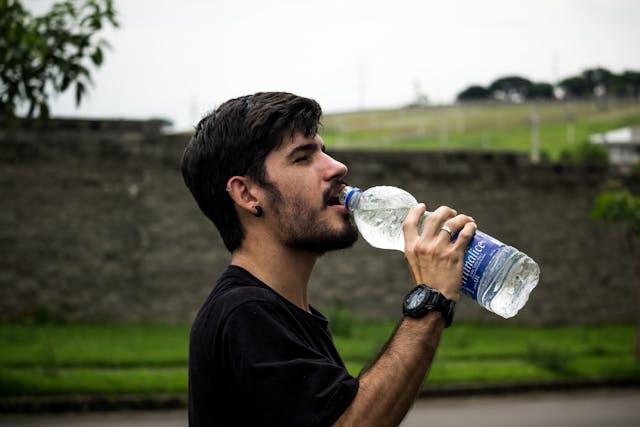
Drinking Enough Water
Water makes up about 60% of your body weight and is vital for maintaining the function of all bodily systems. It lubricates joints, aids digestion, regulates body temperature, and helps flush out toxins.
Even mild dehydration can impact your overall well-being, so staying hydrated is crucial to keeping your body functioning at its best.
In this article, we’ll explore the signs that you are not drinking enough water and offer tips on how to stay properly hydrated.
Common Signs That You Are Not Drinking Enough Water
Dry Mouth and Thirst
One of the earliest signs that you are not drinking enough water is feeling thirsty. A dry mouth or sticky sensation can indicate that your body needs hydration. Thirst is your body’s natural way of signaling that it needs more fluids, so when you feel thirsty, it’s important to drink water immediately.
- Solution: Carry a water bottle with you throughout the day to make it easier to stay hydrated.
Dark Urine
Your urine can provide important clues about your hydration levels. If you are well-hydrated, your urine should be light yellow or clear. Dark yellow or amber-colored urine is a clear sign that you are not drinking enough water. The darker color is a result of your kidneys working harder to concentrate urine to conserve water.
- Solution: Aim to drink enough water so that your urine stays pale yellow throughout the day.
Fatigue and Low Energy Levels
Water helps your body convert food into energy and supports proper circulation. When you are dehydrated, your body struggles to perform these functions, leading to feelings of tiredness, sluggishness, or a lack of focus. If you frequently feel fatigued despite getting enough sleep, dehydration could be the culprit.
- Solution: Drink a glass of water when you start to feel tired to boost your energy levels naturally.
Dry Skin
Your skin is the largest organ in your body, and it requires adequate hydration to maintain its elasticity and health. If you notice that your skin feels dry, flaky, or less elastic, it could be a sign that you are not drinking enough water. Dehydration causes the skin to lose moisture, leading to a dull or tight appearance.
- Solution: In addition to drinking more water, you can use moisturizers to help hydrate your skin from the outside.
Frequent Headaches
Dehydration is one of the leading causes of headaches and migraines. When your body lacks water, it can cause blood vessels in your brain to constrict, leading to headaches. If you often suffer from headaches, especially after periods of physical activity or heat exposure, you may not be getting enough water.
- Solution: Increase your water intake and monitor how your headaches respond. Drinking water regularly can prevent dehydration-related headaches.
Constipation
Water is essential for healthy digestion, helping to soften stool and promote regular bowel movements. If you are not drinking enough water, your body will absorb water from your intestines, making stools harder and more difficult to pass. Chronic dehydration can lead to constipation, discomfort, and bloating.
- Solution: Drink plenty of water throughout the day to keep your digestive system running smoothly. Eating fiber-rich foods can also support digestion.
Dizziness or Lightheadedness
Dehydration can cause a drop in blood pressure, leading to dizziness or lightheadedness, especially when standing up. This occurs because your body doesn’t have enough fluid to circulate blood effectively. If you frequently feel dizzy or weak, particularly in hot weather or after physical exertion, you may need to drink more water.
- Solution: Drink water slowly if you feel dizzy, and try to maintain consistent hydration to prevent these symptoms.
Muscle Cramps
Water plays a key role in regulating electrolyte levels and muscle function. If you are dehydrated, your electrolyte balance can become disrupted, leading to muscle cramps or spasms. This is particularly common during exercise or in hot weather when the body loses water and salt through sweat.
- Solution: Stay hydrated before, during, and after physical activity. In hot weather or during intense exercise, consider drinking an electrolyte-replenishing drink.
Bad Breath
Saliva helps cleanse your mouth of bacteria, but when you are dehydrated, your body produces less saliva. This can lead to an overgrowth of bacteria in the mouth, causing bad breath. If you notice persistent bad breath, it could be a sign that your body needs more water.
- Solution: Drink water regularly to maintain saliva production and prevent bad breath.
Difficulty Concentrating
Dehydration can negatively impact cognitive function, including memory, concentration, and focus. When you are not drinking enough water, your brain doesn’t operate as efficiently, making it harder to stay focused and alert. If you notice difficulty concentrating or mental fog, dehydration could be to blame.
- Solution: Drink water throughout the day, particularly during periods of high mental or physical activity, to keep your brain sharp.
How Much Water Should You Drink?
While individual water needs vary, the general recommendation is to drink about eight 8-ounce glasses of water a day, which equals roughly 2 liters or half a gallon. However, your water needs may increase if you exercise regularly, live in a hot climate, or are pregnant or breastfeeding.
Tips to Stay Hydrated
- Carry a water bottle: Having water readily available will encourage you to drink more throughout the day.
- Set reminders: Use a phone app or alarm to remind yourself to drink water at regular intervals.
- Eat water-rich foods: Fruits and vegetables like watermelon, cucumbers, and oranges are high in water content and contribute to your hydration.
- Drink water before meals: Make it a habit to drink a glass of water before eating to stay hydrated and aid digestion.
In Summary
Staying properly hydrated is essential for your overall health and well-being. If you notice signs like dry mouth, dark urine, fatigue, or headaches, it may be time to increase your water intake. By paying attention to these warning signs and drinking enough water, you can ensure that your body stays hydrated and functions optimally.





